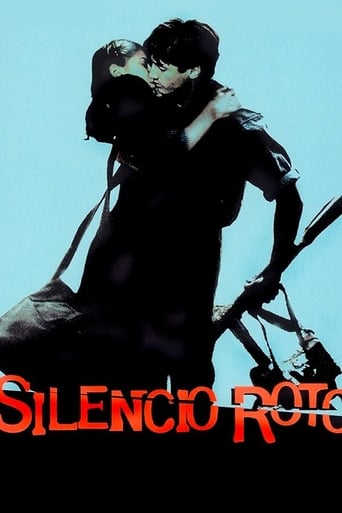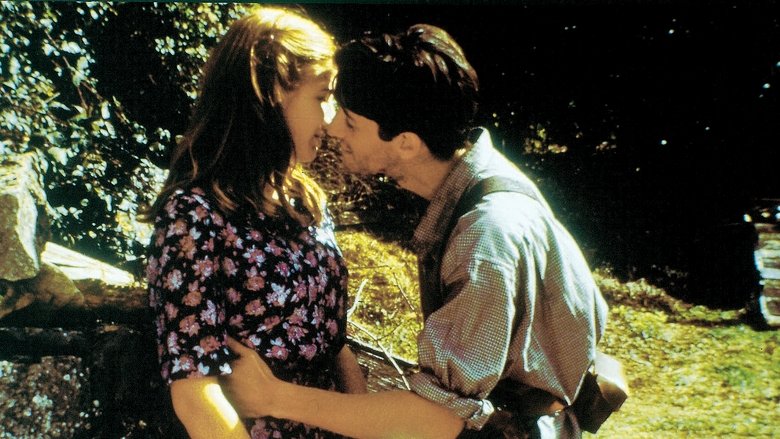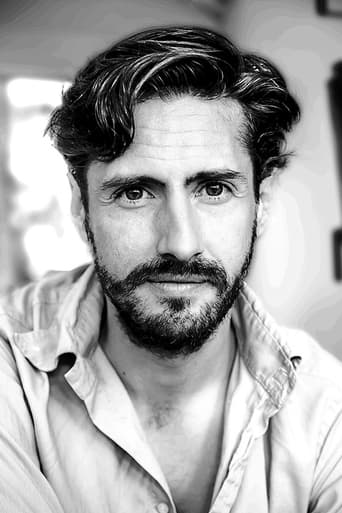Broken Silence (2001)
Winter, 1944. Lucía at 21 returns to her small village in the mountains. She again meets Manuel, a young iron-smith who helps "those in the mountain", the "maquis", the anti-Franco resistance. Lucía is attracted to Manual, because of his smile and the bravery of those men who continue fighting for their ideas, even at the cost of their own lives. When Manuel is pursued (by Franco's Civil Guard) he flees to the mountain and Lucía discovers the reality of political repression, the silence, the horror and fear.
Watch Trailer
Cast


Reviews
Wonderful character development!
Don't listen to the Hype. It's awful
The movie's neither hopeful in contrived ways, nor hopeless in different contrived ways. Somehow it manages to be wonderful
There are moments in this movie where the great movie it could've been peek out... They're fleeting, here, but they're worth savoring, and they happen often enough to make it worth your while.
Dramatic picture about the consequences of Spanish civil war , Maquis or Republican guerrillas , the anti-Franco resistance and many other things . "Broken Silence", adapted from a screenplay by the same director Montxo Armendáriz , being realized with academicism and general coldness ; adding a splendid , luxurious photography with juicy atmosphere . This slow-moving and intelligent picture is well set in Spain of the 40s . It happens in Winter, 1944 , a heavily wooded valley of the River Urrobi called Valle Arce . Lucía (Lucia Jimenez) at 21 returns to her small village in the Pamplona mountains to live with her uncle (Pepo Oliva) and aunt (Mercedes San Prieto) . She again meets Manuel (Juan Diego Botto), a young Blacksmith who helps "those in the mountain", the "maquis", these brave Guerrilleros go on battling for their ideas , even at the cost of their own existences . Then , a traitor informs about resistance fighters and Manuel is chased by Franco's Civil Guard (Joseba Apaolaza , Jordi Bosch) . Later on , he escapes to the mountain along with other members (Ramon Barea , Patxi Bisquert , among others) of guerrilla and Lucía uncovers the terror , vengeance , fear , treason and the broken silence.¨Silencio Roto¨ or ¨Broken silence¨ results to be other of the innumerable stories to deal with dramatic deeds regarding the Civil War background and Franco epoch . A familiar theme about the global horrors of a fratricide war , impossible to forget to our cinema .This interesting historical story is a passionate retelling and a touching as well as intense drama . Armendariz , also writes the script and filmed in his usual formal and stylistic scholarship , without leaving a trace the thought-provoking issues , in terms of dramatic and narrative excitement , including the reality of political repression , betrayal , accusation and political facts by that time . This is a Spanish average budget production and obtained enough success in the box-office . The main problem has to face "Silencio Roto", beyond not being able to avoid falling into the politic pamphlet is precisely derived from the coldness of its staging , which eventually become monotonous over two hours of footage . Because the story needs a vibration more real than the one offered in this slow-moving and sometimes boring film . But anyway, its is compensated with the great performances from main and support cast specially . Agreeable acting by starring couple who plays an enjoyable love story in which beautiful Lucía/Lucia Jimenez is attracted to a young iron-smith Manuel/Juan Diego Botto , because of his smile and the bravery . Secondary players are frankly excellent ; as a magnificent support cast of known and prestigious players , such as María Botto , Rubén Ochandiano , María Vázquez , Patxi Bisquert , Pepo Oliva , Jordi Bosch and special mention to veterans as Ramón Barea , Alvaro De Luna , Mercedes San Pietro , Asunción Balaguer , Francisco Rabal's wife and , in addition , Manuel Lozano , the starring boy in ¨Secretos del Corazón¨ . Besides , a spotless pictorial cinematography by Guillermo Navarro , Guillermo Del Toro's ordinary cameraman , and a willingness , almost perfect of the elements of each shot , every sequence, every space . A colorful picture , including marvelous frames , being mostly filmed at Arrieta, Vizcaya , Lusarreta, Navarra, Saragüeta, and Villanueva de Arce, Navarra, Spain . Sensitive and emotive musical score by Pascal Gaigne . The picture achieved various prizes such as Butaca Awards 2001 Best Catalan Film Actress : Mercedes Sampietro , CEC Award Best Supporting Actress Mercedes Sampietro , Nantes Film Festival 2002 Won best director and Nominated Goya Best New Actor Rubén Ochandiano . Well directed film by Montxo Armendariz , including his own story and screenplay , who tried to create an agreeable flick plenty of sensitivity and sometimes violent confrontation between Maquis and Guardia Civil by tackling an evocative description about a particular period in Spain history . The motion picture perfectly produced by producers Puy Oria and Montxo Armendáriz was professionally directed by the latter , a very good Spanish movies director . Armendariz directed a series of award-winning movies firmly establishing him as one of the best Spanish filmmakers and an expert on literary adaptations . Montxo is a well recognized filmmaker both nationally and internationally, and in proof of it he won many awards in several Festivals . Montxo Armendáriz was born in Navarra, Pamplona , and his films are mostly set in this Spanish region . He is a nice writer and director, expert on dramas , being especially known for Tasio (1984) , 27 hours (1986) , Cartas a Alou (1990) , Secretos del Corazón (1997), (2001) Obaba (2005), No Tengas Miedo (2011) and this Silencio Roto or Broken silence .
I saw this film in Madrid and experienced something I had never encountered in a Spanish cinema--- the audience was completely silent during the film. And the house was packed.The beautiful setting of the film, in the north of Spain, stood in sharp contrast to the depressing circumstances of the villagers as they attempted to carry on the struggle against the Falange as represented in the film by the Guardia Civil. The drama of this well-acted film was steady and wrenching.Always interested in the Spanish Civil War, this film made me more aware of the heavy price the Spaniards paid as a consequence of the fascists' victory.
Montxo Armendariz film about an episode of the Spanish history is interesting, but at the same time it is very confusing, as proven by the samples heard after the projection at the recent film cycle at the Walter Reade theater in New York.Most of us in the audience obviously knew about some of the history that is shown in the film, but not enough as the first person, Ossanser, from Valencia, Spain who wrote the first commentary on the opening page . That is why at times we are lost in trying to think how was it possible to see the rebels fighting when both the Civil War and World War II were over.The film was interesting to watch, but there are a lot of loose ends that are not resolved, as far as we are concerned.Loved the women in this film the best. Lucia Jimenez, Mercedes Sanpietro and Maria Botto were very restrained. It's about the best quality I find with Mr. Armendariz's films, in contrast with some other Spanish directors, he's the captain of the ship and nothing seems to be out of place, contrary to other 'geniuses' from Spain who sometimes let the cast get away with murder.One can only wish the best to this director in future films.
Don't miss it.First, I don't know if it's a honour to be the first one to make any statement on that film or just a shame not a person among those who've already seen it (only in Spain I think) made up its mind and write on it. For those who lack some knowledge on Spanish Civil War and Post-War period: some historical factsSpanish War began 18th July 1936 when the African troops raised against Spanish Republican Gov. Their leader was Franco, who gained his reputation in 1920's colonial war's in Morocco. The Legion and it's leaders were demoralized after what they thought was a shameful withdrawal from Northern Africa. Spain retained two cities (Ceuta and Melilla), and Sidi Ifni (Western Sahara, which was occupied by Morocco after 'Green March' in 1974-75, and this time with a languishing Franco!). Spain became the ground to proof German modern war techniques sustained on persistent plane bombing ('Stukas' made their debut destroying cities loyal to Republic, remember Picasso's 'Gernica'? this Basque village with strong political and historical significance was demolished completely, not a building was standing after the German Luftwafe finished its work). As ever, some countries remained neutral ( mainly France, UK, USA)if it is possible to be so, while others (say Germany and Italy) played an important role in war. From neutral countries came lots (60-70 thousand) of men not only British, American and French but Italians, Germans, Canadians and from all around Europe. But these fighters weren't as well equipped and trained as German and Italian troops that were sent by Mussolini and Hitler. And what about USSR? They didn't mind much, just asked for money to send some weapons and ammunition. No troops. So the Republican side (which had in it's power the main cities and industrial regions in the beginning) couldn't beat the right army. This happened April 1st 1939. If war is thought to be a hard experience, what about some post-war periods? The victors revenged for years against those people belonging to republican families. 10 years after war ended still were thousands in prison. No amnesty. Some people didn't assume that the Coup had won, and they thought that if they resisted until Democratic countries beat Fascism in Europe, they would be helped dethrone Franco's dictatorship. But of course, they were wrong. Democratic leaders were afraid that Spain would became a communist country in line with centre-eastern Europe soviets satellites, so they, again, preferred a right wing government. The guerrillas were called 'Maquis' which is a French word meaning Bush. These commandos existed from 1939 (end of the war) to early 1950's! And is reckoned to be about 5000 men fighting in the countryside (mainly in northern regions) and a much bigger number of people supporting them. The most of the Maquis fighters are died but they were granted recently some political and historical recognition in Spanish Parliament.The Film. The story runs in a little village in Navarra (close to French border). The main characters are the women ones' the men being just as egoistic as to think only of them and their ideas and to fight for them bravely but not caring for the consequences, at least not always. Quick summary of strong points: The screenplay, it's wonderfully written by also director Montxo Armendariz. He's from the land where it's shot and he's lived the ambient he describes. Lot's of good personages and sequences. Dialogs are also great, mordacious when it comes and also tender, even funny. The main plot line is the Maquis resistance, but there's a lot more underlying like self respect, dignity, love and courage in bad times. It's about people who fall in love like the two youngsters: (Manuel-Juan Diego Botto and Lucía-Lucía Jiménez) the blacksmith whose father is a Maquis and the Inn's owner's (Teresa-Mercedes Sampietro) niece. A story of a mature love affair between Teresa and Don Hilario (a former teacher due to its leftist ideals) that lasts instead of her marriage to a horrible husband. The love of parents for children, like the two old that live in the mountains hoping to see sometime their already died son ( their cabin is like a haven for Maquis were they can get some food, once in a while the supplier brings them a letter written on its own handwriting supposing to be from their son who was shot down time ago). The love too of a Guardia's wife whose always afraid for his life. The actors and actresses: great, but especially the women. Teresa, Lucía, Lola, Juana, Julia. Are as good when they're leading the scene in close-ups as when they're just filling the screen, standing and hearing the others. They know how to suffer, they're so accustomed to suffer for others... and yet they're still human, deeply human. In war times women have to work twice.Location, Photography, Score: Perfect. I think the music's a must buy.Direction: Armendariz's best work. He deserves a 10.If scenes work perfectly and performances are full of shades who's to blame?There's some flavour of 'film noir' in the final scene when Lucía's leaving the Inn and turns to Lola and says 'Siempre me quedará la duda de si fuiste tu quién les delató' ('I'll always doubt whether it was you that spoke against them'), while Lola's cleaning some glasses and doesn't even utter a word.I gave it 9/10 (I'm waiting for some years to give it the 10 I think it deserves). BTW: the screenplay's already been published.









